
18 Wheeler: American Pro Trucker, known in Japan as 18 Wheeler, is an arcade game developed by Sega AM2 and distributed by Sega. The game was released in arcades in 2000 and ported to the Dreamcast in 2001. It was released for the PlayStation 2 in 2001 and GameCube in 2002 by Acclaim Entertainment. Sega followed up on the success of 18 Wheeler with a sequel, The King of Route 66, which was released in the arcades in 2002 and ported to the PlayStation 2. This was one of the final arcade games to be ported to the Dreamcast after its discontinuation, before Sega became a third-party developer.

Capcom vs. SNK 2: Mark of the Millennium 2001 is the sequel to the fighting game Capcom vs. SNK. It was originally released on NAOMI hardware in arcades, with Sega handling the American arcade release. As in the original, players select a team of fighters from various Capcom and SNK games then fight other teams, winning each battle by defeating all the opponents from the other team.

Midnight Club: Street Racing is a 2000 racing video game developed by Angel Studios and published by Rockstar Games. The game focuses on competitive street racing and the import scene. The game was released for the PlayStation 2 and Game Boy Advance platforms, the former being a launch title for the platform. It is the first game in Midnight Club franchise, followed by Midnight Club II.

Madden NFL 2003 is an American football simulation video game based on the NFL that was developed by EA Tiburon and Budcat Creations and published by EA Sports. The 14th installment of the Madden NFL series, the game features former St. Louis Rams running back Marshall Faulk on the cover. This edition of Madden was the first to have EA Trax, the Mini Camp mode, and to feature Al Michaels as play-by-play announcer, who took over for Pat Summerall. Although it featured the expansion Houston Texans and the relocation of the Seattle Seahawks to the NFC, it was actually the second to do so. The game was released on August 12, 2002 for the Game Boy Advance, GameCube, Microsoft Windows, PlayStation, PlayStation 2 and Xbox. The PlayStation version also includes the Sega Genesis version of John Madden Football 93.
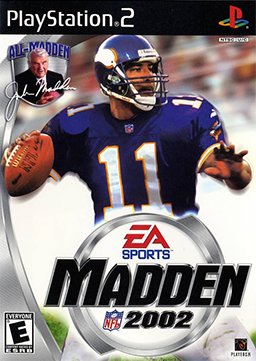
Madden NFL 2002 is an American football video game. It features former Minnesota Vikings quarterback Daunte Culpepper on the cover. Pat Summerall and John Madden are the commentators. The Madden NFL 2002 commercial first aired during Super Bowl XXXVI, three days after Madden NFL 2002 started selling in Japan. Notably, it does not feature the Super Bowl MVP Tom Brady, who is included on later editions of the game as a roster update. It is also the first game to be developed by Budcat Creations.

NBA Live 2001 is the 2001 installment of the NBA Live video games series. The cover features Kevin Garnett as a member of the Minnesota Timberwolves. The game was developed by EA Canada and published by Electronic Arts under the EA Sports Label. NBA Live 2001 is followed by NBA Live 2002. The PC version of the game for the second year included EA's "Face in the Game" feature that debuted in NBA Live 2000, allowing players to use custom facial photographs on created players.

NBA Live 2003 is the 2002 installment of the NBA Live video games series. The cover features Jason Kidd as a member of the New Jersey Nets. The game was developed by EA Canada and released on October 8, 2002 for the PlayStation, PlayStation 2, Xbox, and GameCube consoles and November 14, 2002 for Microsoft Windows. It was the last NBA Live game to be released on the original PlayStation. The game includes a soundtrack, which is the first video game soundtrack in history to be certified Platinum by the RIAA, selling over 1,300,000 copies worldwide.
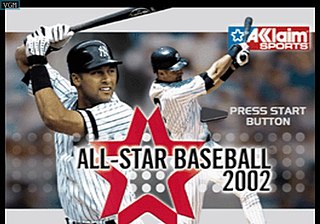
All-Star Baseball 2002 is a baseball sports game released for PlayStation 2 and GameCube in 2001.

Batman: Vengeance is a 2001 action-adventure video game based on the fictional superhero of the same name. It was released for PlayStation 2, Game Boy Advance, GameCube, Xbox and Microsoft Windows. The game was developed and published by Ubi Soft in conjunction with Warner Bros. and DC Comics.
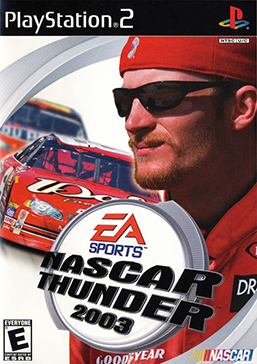
NASCAR Thunder 2003 is the sixth edition of the EA Sports' NASCAR racing simulator series. Developed by EA Tiburon and Budcat Creations and published by EA Sports. It was released for PlayStation, PlayStation 2, GameCube, and Xbox on September 18, 2002, and for Microsoft Windows on October 21. The product features Dale Earnhardt Jr. on the cover. It was the first time the NASCAR's Most Popular Driver Award recipient was featured on the cover, although he did not win the award for the first time until the following year. Dale Earnhardt appeared in the game as a driver as a result of entering his name as a Create-A-Car driver's name; he did not appear in the previous game due to his death. He appeared as a legend in subsequent games.

Dave Mirra Freestyle BMX 2 is a sports video game developed by Z-Axis and Full Fat and published by Acclaim Entertainment under their Acclaim Max Sports label. It was released for the PlayStation 2 in August 2001, and in the following months it was ported to the GameCube, Game Boy Advance, and Xbox video game systems. Both the GameCube and Xbox ports featured two extra levels that were not present in the PS2 version.

NBA Ballers is a 2004 streetball simulation video game developed and published by Midway. The game features fictional NBA analyst Bob Benson and MC Supernatural as the commentators. A majority of the moves in the game were from amateur basketball players, who provided some of their moves for the game. Stephon Marbury is on the cover.
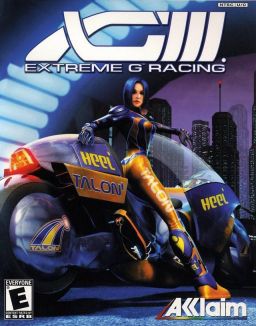
XGIII: Extreme G Racing, also known as Extreme-G 3, is a racing video game developed by Acclaim Studios Cheltenham and published by Acclaim Entertainment for PlayStation 2 and GameCube. The game is followed by XGRA: Extreme G Racing Association.

NBA Street V3 is a basketball video game developed by EA Canada and published by Electronic Arts under the EA Sports BIG label. It is the third installment in the NBA Street series, and originally released in February 2005 for GameCube, PlayStation 2, and Xbox. The game was ported to PlayStation Portable under the title, NBA Street Showdown.

NHL 2002 is a video game released by EA Sports in 2001. It is the predecessor to NHL 2003. The game's cover man is Pittsburgh Penguins superstar and owner Mario Lemieux, who had just made a comeback after being retired for three and a half years. It was the first installment of the NHL series to be released on Xbox.

ESPN MLS ExtraTime is a sports video game released in 2001-2002 by Konami. It is available for PlayStation 2, Xbox, and GameCube. Clint Mathis is on the cover. The original ExtraTime was released for PS2 seven months after ESPN MLS GameNight on the PlayStation, with the GameCube and Xbox versions released in 2002 afterward as ESPN MLS ExtraTime 2002. MLS ExtraTime was the last in the series as the MLS sold its video game license to EA Sports' FIFA series.
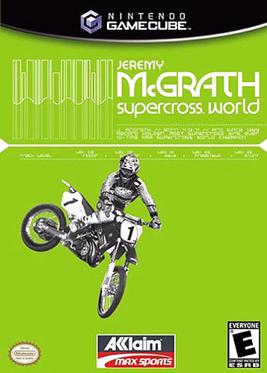
Jeremy McGrath Supercross World is a racing video game developed by Acclaim Studios Salt Lake City and published by Acclaim Entertainment under their Acclaim Max Sports label for PlayStation 2 and GameCube.

NBA Hoopz is a 2001 basketball video game published by Midway. It is the sequel to NBA Hangtime and NBA Showtime: NBA on NBC. Hoopz was the only 3-on-3, arcade-style basketball video game available during the 2000–01 NBA season. Shaquille O'Neal is featured on the game cover.
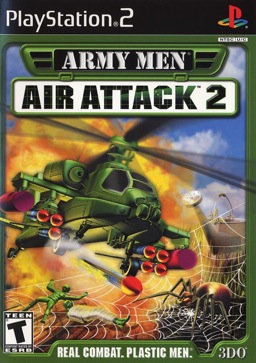
Army Men: Air Attack 2 is a third-person shooter video game developed and published by The 3DO Company for PlayStation, PlayStation 2 and GameCube.

NBA 2K2 is a 2001 sports video game developed by Visual Concepts and published by Sega for Dreamcast, PlayStation 2, Xbox and GameCube. NBA 2K2 featured more street courts such as Mosswood, Fonde Rec Center, Venice Beach, etc. The cover athlete is Allen Iverson of the Philadelphia 76ers.




















